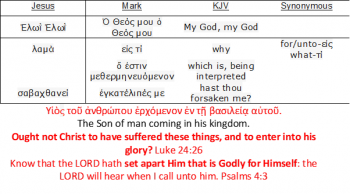enkataleipo is a stronger form of leipo, which does indeed mean, to leave. Enkataleipo means to 'forsake,' or 'abandon.' Which is what happened to the Lord Jesus Christ on the cross between the third and ninth hours.
λείπω
Luke 18:22
Yet
lackest thou one thing: sell all that thou hast, and distribute unto the poor, and thou shalt have treasure in heaven: and come follow me.
Ἔτι ἕν σοι λείπει· πάντα ὅσα ἔχεις πώλησον καὶ διάδος πτωχοῖς, καὶ ἕξεις θησαυρὸν ἐν τοῖς οὐρανοῖς, καὶ δεῦρο ἀκολούθει μοι.
Titus 1:5
the things that are
wanting set in order
τὰ λείποντα ἐπιδιορθώσῃ
Titus 3:13
on their journey nothing be
wanting unto them
σπουδαίως πρόπεμψον ἵνα μηδὲν αὐτοῖς λείπῃ
James 1:4
But let patience have her perfect work, that ye may be perfect and entire,
wanting nothing.
ἡ δὲ ὑπομονὴ ἔργον τέλειον ἐχέτω, ἵνα ἦτε τέλειοι καὶ ὁλόκληροι, ἐν μηδενὶ λειπόμενοι.
James 1:5
If any of you
lack wisdom, let him ask of God
Εἰ δέ τις ὑμῶν λείπεται σοφίας, αἰτείτω παρὰ Θεοῦ
James 2:15
If a brother or sister be naked, and
destitute of daily food,
ἐὰν ἀδελφὸς ἢ ἀδελφὴ γυμνοὶ ὑπάρχωσιν καὶ λειπόμενοι τῆς ἐφημέρου τροφῆς
καταλείπω
(literal/physical)
Distancing out/from place in/to place
Matthew 4:13
leaving Nazareth, he
came and dwelt in Capernaum
καταλιπὼν τὴν Ναζαρὰ ἐλθὼν κατῴκησεν εἰς Καφαρναοὺμ
Mark 8:13 Matthew 16:4
And he
left them
and departed to the other side.
καὶ ἀφεὶς / καταλιπὼν αὐτοὺς ἀπῆλθεν εἰς τὸ πέραν.
Matthew 21:17
He
left them
and went out of the city into Bethany and lodged there.
καταλιπὼν αὐτοὺς ἐξῆλθεν ἔξω τῆς πόλεως εἰς Βηθανίαν, καὶ ηὐλίσθη ἐκεῖ.
Acts 18:19
And he came to Ephesus, and
left them there: but he himself
entered into the synagogue, and reasoned with the Jews.
κατήντησαν δὲ εἰς Ἔφεσον, κἀκείνους κατέλιπεν αὐτοῦ, αὐτὸς δὲ εἰσελθὼν εἰς τὴν συναγωγὴν διελέξατο τοῖς Ἰουδαίοις.
Acts 21:3
we
left Cyprus on the left hand,
and sailed into Syria,
Κύπρον καὶ καταλιπόντες αὐτὴν εὐώνυμον ἐπλέομεν εἰς Συρίαν
Acts 24:27
Felix
left / kept Paul
bound
Φῆλιξ κατέλιπε τὸν Παῦλον δεδεμένον
Acts 25:14
a certain man
left in bonds by Felix:
τίς ἐστιν καταλελειμμένος ὑπὸ Φήλικος δέσμιος
1 Thessalonians 3:1
we thought it good to be
left at Athens
alone
ηὐδοκήσαμεν καταλειφθῆναι ἐν Ἀθήναις μόνοι
Titus 1:5
For this cause
left I thee
in Crete,
Τούτου χάριν ἀπέλιπόν [κατέλιπον variant] σε ἐν Κρήτῃ
καταλείπω
(literal/physical)
Distancing out/from situation/condition in/to situation/condition
Mark 10:7 Mt19:5 [Ephesians 5:31]
man shall
leave father and mother
and cleave to his wife
καταλείψει ἄνθρωπος τὸν πατέρα καὶ τὴν μητέρα καὶ κολληθήσεται τῇ γυναικὶ
Mark 12:19 (Lk20:31)
If a man's brother
leave his wife
and leave no children (they left no children, and died)
ἐάν τινος ἀδελφὸς ἀποθάνῃ καὶ καταλίπῃ γυναῖκα καὶ μὴ ἀφῇ τέκνον (οὐ κατέλιπον τέκνα καὶ ἀπέθανον)
Mark 14:52
he
left the linen cloth,
and fled naked.
ὁ δὲ καταλιπὼν τὴν σινδόνα γυμνὸς ἔφυγεν.
Luke 10:40
my sister hath
left me
to serve alone
ἀδελφή μου μόνην με κατέλειπεν διακονεῖν
Luke 15:4
leave the ninety and nine in the wilderness,
and go after that which is lost,
καταλείπει τὰ ἐνενήκοντα ἐννέα ἐν τῇ ἐρήμῳ καὶ πορεύεται ἐπὶ τὸ ἀπολωλὸς
Luke 5:28
Levi
left all, rose up,
and followed him.
Λευεὶν καταλιπὼν πάντα ἀναστὰς ἠκολούθει αὐτῷ.
John 8:9
Jesus was
left alone,
and the woman
standing in the midst
κατελείφθη μόνος ὁ Ἰησοῦς, καὶ ἡ γυνὴ ἐν μέσῳ ἑστῶσα
Acts 6:2
It is not reason that we should
leave the word of God,
and serve tables.
Οὐκ ἀρεστόν ἐστιν ἡμᾶς καταλείψαντας τὸν λόγον τοῦ Θεοῦ διακονεῖν τραπέζαις
καταλείπω
Distancing spiritually/by faith
Romans 11:4
I have
reserved to myself seven thousand men, who have not bowed the knee to the image of Baal.
Κατέλιπον ἐμαυτῷ ἑπτακισχιλίους ἄνδρας, οἵτινες οὐκ ἔκαμψαν γόνυ τῇ Βάαλ
Ephesians 5:31 [Mark 10:7 Mt19:5]
For this cause shall a man
leave his father and mother, and shall
be joined unto his wife, and they two shall be one flesh.
ἀντὶ τούτου καταλείψει ἄνθρωπος τὸν πατέρα καὶ τὴν μητέρα καὶ προσκολληθήσεται πρὸς τὴν γυναῖκα αὐτοῦ, καὶ ἔσονται οἱ δύο εἰς σάρκα μίαν.
Hebrews 4:1
Let us therefore fear, lest, a promise
being left us
of entering into his rest, any of you should seem to come short of it
φοβηθῶμεν οὖν μή ποτε καταλειπομένης ἐπαγγελίας εἰσελθεῖν εἰς τὴν κατάπαυσιν αὐτοῦ δοκῇ τις ἐξ ὑμῶν ὑστερηκέναι.
Hebrews 11:27
By faith he
forsook Egypt, not fearing the wrath of the king: for he endured,
as seeing Him who is invisible
Πίστει κατέλιπεν Αἴγυπτον, μὴ φοβηθεὶς τὸν θυμὸν τοῦ βασιλέως· τὸν γὰρ ἀόρατον ὡς ὁρῶν ἐκαρτέρησεν
Aphi-ehmi
Mark 10:27
every one that hath
forsaken houses or brethren or sisters or father,
καὶ πᾶς ὅστις
ἀφῆκεν οἰκίας ἢ ἀδελφοὺς ἢ ἀδελφὰς ἢ πατέρα
Mark 10:28
Peter began to say unto him, Lo, we have
left all, and have followed thee.
Ἤρξατο ὁ Πέτρος αὐτῷ Ἰδοὺ ἡμεῖς
ἀφήκαμεν πάντα καὶ ἠκολουθήκαμέν σοι.
Matthew 19:27,28
answered Peter him, Behold, we have
forsaken all, and followed thee
ὁ Πέτρος εἶπεν αὐτῷ Ἰδοὺ ἡμεῖς
ἀφήκαμεν πάντα καὶ ἠκολουθήσαμέν σοι
Matthew 26:56
But all this was done, that the scriptures of the prophets might be fulfilled. Then all the disciples
forsook him, and fled.
τοῦτο δὲ ὅλον γέγονεν ἵνα πληρωθῶσιν αἱ γραφαὶ τῶν προφητῶν. Τότε οἱ μαθηταὶ πάντες
ἀφέντες αὐτὸν ἔφυγον.
Mark 14:50
And they all
forsook him, and fled.
καὶ
ἀφέντες αὐτὸν ἔφυγον πάντες.
TBC DV ASAP with en-kataleipoh


 9]
9]